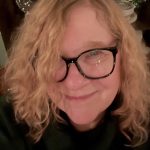|
RCBJ-Audible (Listen For Free)
|
Editor’s Note: The arts are a significant thread in the fabric of Rockland County. They inspire, enrich, and chronicle our lives. They also play a role in our economic well-being; theater, writing, dance, crafts draw us to spaces. They invite strangers to share in our bounty. They are an indelible contribution. Welcome again, Christine Potter, a poet, to RCBJ.
For National Poetry Month: Meet Juan Mobili, Poet Laureate of Rockland County
By Christine Potter
 Summer three years ago, I sat on the back deck of a vacation rental, talking with my friend Judy Kaber, for two years the poet laureate of Belfast, Maine. Judy’s someone with whom I often share my own poems. I’d read poetry by her any old time, but what I remember most about that afternoon was the cool thing Judy told me about being Belfast’s laureate: she sometimes got to wear a robe that’s been passed from laureate to laureate over the years, with all the prior laureates’ names embroidered on it. An actual robe! I don’t think my flash of envy was wrong, really…
Summer three years ago, I sat on the back deck of a vacation rental, talking with my friend Judy Kaber, for two years the poet laureate of Belfast, Maine. Judy’s someone with whom I often share my own poems. I’d read poetry by her any old time, but what I remember most about that afternoon was the cool thing Judy told me about being Belfast’s laureate: she sometimes got to wear a robe that’s been passed from laureate to laureate over the years, with all the prior laureates’ names embroidered on it. An actual robe! I don’t think my flash of envy was wrong, really…
If Nyack were in Maine, it would be Belfast, a lively place both boho and full of salt-of-the-earth working folks who have lived in the area forever. Belfast, Maine is a town with a poet laureate! So it shouldn’t surprise you that Rockland County is a place that has one, too, and a good one: Juan Pablo Mobili.
I’m so glad I got in touch with him. Juan may not have a robe like my pal Judy did, but he does write my favorite kind of poetry: accessible, full of sharp imagery, deeply wise. Mobili was in the literary magazine Sheila-na-gig with this beauty, perfect for these turbulent days:
The Sacrament of Grapefruit
My mother would spoon
the grapefruit’s flesh,
piece by piece, out of their casings,
and sprinkle them with sugar
to entice her two young boys
to give bitterness
a mild and early try
or hide the nature of life’s taste.
She was taught that God
must always be forgiven
for not answering our prayers,
because we were too flawed,
too self-involved,
or too damn mortal
to understand even a fruit.
That was my mother’s
grapefruit sacrament,
her hope we grew
a rind thick enough
“to live and tell about it,”
to be ready to face a tart existence,
its bitter pulp arranged
in strict compartments.
The first time I read this poem, I was instantly transported back to my own childhood, eating grapefruit because it was the 60’s, grapefruit was low-cal, and it was supposed to make me skinny like Twiggy (not a chance!). Juan Mobili takes it a lot deeper than that: the bitterness of the fruit, how the mother uses sugar to give her sons “a mild and early try” of life’s bitterness. Grapefruit in this poem becomes a challenging sacrament indeed. The amazing second stanza about the mom’s belief that people need to forgive God blew me away. And I admired how Mobili turns the poem’s sons—and life itself– into grapefruits with hoped-for thick rinds, and the “bitter pulp” in “strict compartments.”
There’s a whole lot going on in this seemingly-simple poem, and it’s wisdom we need—especially right now with things so very grapefruit-flavored!
Juan Mobili was born in Argentina, but Rockland County, with its good schools and great natural beauty welcomed him and provided a supportive home for his family to grow. Ask him what he loves about it here, and he mentions the Hudson River and ARC of Rockland both (he raised a special-needs son). He sees his job as Rockland’s Poet Laureate as one of connection: “Fundamentally, I want to connect writers to writers, writers to artists, writers to readers… ultimately, people to people within our county. Language is a tremendous gift and power…It may sound romantic, but I see it as critical to develop, to build, a sense of being members of a community. That said, two constituencies that are particularly important to me are young people (especially teenagers) who are figuring out who they are, and older adults who lived a fair portion of their lives and might want to share what they learned about who they’ve become.”
Mobili advises young poets to keep at it: “Write, write, write: poems, stories, about what touches you, both grief and joy… and, also, read, read, read… and learn from great poets and writers, pay attention to their craft. Then, if you decide that poetry is not just ‘a phase’, if you know you are in the world to write, do it as well as you can. Honor the power and gift of language by writing as well as you can. I’m still doing that.”
I love it that he addressed both old and young writers when I asked him about his job. Mobili likewise envisions himself as both teenager and and older person in his poem “Learning to be a Foreigner,” which originally ran in Rise Up Review. Here it is:
Learning to Be a Foreigner
Who else would travel on holiday to arrive home, and realize
that his sudden revelation was only an old memory?
Who would seem a stranger to his own family?
His mother asking questions only
her son would be able to answer,
his brother hoping secretly this tourist
is a kinder version of a sibling
who robbed him from everyone’s applause.
But it all starts to make sense when he stands
before the window of his long gone, favorite bookstore,
when he notices that the man on the reflection, old
enough to be a grandfather, did not live here before.
He was thinking of a teenager never sure of his voice,
not this man who looks at himself without blinking,
without shifting his weight like that kid. Now
he’s a foreigner, even in the city where he was born.
One of the most interesting things about aging is how we are at once who we were—and who we have become. Two different people in one, right? This poem plays with the idea of national identity, too; its speaker, “old enough to be a grandfather, did not live here before.” He has emigrated, become the foreigner in the poem’s title, although he can now see his own reflection “without blinking, without shifting his weight.” His brother sees him as “this tourist,” he thinks.
Like “The Sacrament of Grapefruit,” this poem lives very much inside a family. So does it describe a loss? Its speaker is now more comfortable in his own skin, but he feels like “a stranger to his own family.” The shop window in which he gazes at himself is of “his long gone, favorite bookstore.” Mobili lived in Argentina during the worst years of dictatorship there, which makes his perceptions even more valuable just now.
Juan Mobili’s chapbook Contraband was published by The Poetry Box in 2022,, and is still available there. He is shopping around another collection of poems. We won’t jinx the new book by saying anything else!
I wonder what would happen if we let the poet laureates of everywhere run things worldwide for say, a week. Big towns, little towns, counties, national poet laureates… Yeah, there’d probably be some trash talk about poetic form and prose poems and stuff, but I bet we’d all sleep better for a while.
Since Juan Mobili writes about memory, I’ll close with a memory poem of my own. Memory is a funny thing: every time you tell a story, it’s like pulling something out of a drawer and then putting it back, so stuff kind of shifts. I find myself checking dates and texting my sister when I write about old stuff, often. But both my husband and I have memories of middle-of-the-night Rockland Bakery runs for freshly baked bread. Long-time Rocklanders: was the place really open at 2 AM back in the day? I swear it was. I read this poem on the Viewless Wings podcast:
Nocturne: Rockland Bakery
maybe the 70’s, maybe the 80’s
Absolutely nothing was beautiful about it except
the smell of bread dough tempered with a whiff
of burnt raisins from the oven floor, the sleepy
beat of sparse traffic on Route 304: red lights with
blocks of black nothing behind them—always in
the depths of late summer, air-conditioned bars
emptying out, everything that ever happened
in the Hudson Valley having just exhaled, weighting
the air with humidity. Late night soft on our
bare arms as we slammed car doors, ran giggling
to the always-open storefront for long, brown
bags, then down a hall to dozens of bagels or
salt sticks or Kaisers continuously emerging on
tracks fitted with rollers from an impossibly huge
impossibly hot furnace. You were free to grab what
you wanted as it slid toward you, to bag it fast so
you wouldn’t get burned. Caraway seeds underfoot,
a labyrinth of marble rye and pumpernickel bread
on steel racks almost too tall to reach—skyscrapers
of bread! You’d get a loaf and have it sliced, pay
the cashier who asked you how much you’d taken
and charged you wholesale. Later, maybe Nyack,
maybe Piermont—a parking place by the river with
Manhattan sparkling like a distant crown on dark
water. Napkins in the glove compartment, windows
down, the putter of a boat passing, then the little
ripples. Someone always remembered to bring butter.
And now I’m thinking about salt sticks. Might have to do something about that! See you in May.












